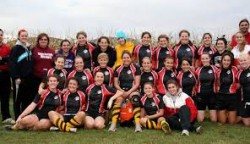
Cici Chagnon (cichagnon@ursinus.edu)
Boasting 25 sports and 15 varsity teams, Ursinus College has no shortage of athleticism. According to the Ursinus Website, one third of students are varsity athletes and many Ursinus students still participate in sports despite not playing on a varsity team. A quick trip to the college website will show that 85% of the student body participates in some form of athletics. Club sports such as rugby and cheerleading, performing groups such as Dance Team and Escape Velocity, and intramurals are popular groups on-campus. There is certainly an abundance of opportunities to stay active. However, Bears face some barriers in participating in these groups while also staying healthy. Such activities can be physically intense, especially for dedicated members. To maintain the health of students looking to stay physically fit, non-student athletes should have access to athletic trainers.
Injuries can occur to students even if their sport of choice doesn’t practice every day or travel far away for games. While varsity athletes should of course have priority, non-athlete students could greatly benefit from having the ability to meet with a trainer. The Wellness Center is a good resource, but an athletic trainer’s expertise is in sports. For cheerleaders, rugby players, or dance majors, waiting for an appointment at Wellness can be a setback. Sometimes taking care of your body is as simple as getting an ankle taped or grabbing a bag of ice, but without trainers, this is difficult. Even merely asking a question about stretching or rolling could make a difference to students participating in athletics. Moreover, to ensure the safety of all participants, a trainer on site during games or performances could help prevent the injuries that take some students out of their on-campus hobbies. Especially for students without cars on campus, having easy access to health resources is vital to their well-being. Physical activity is also a great way to improve mental health, and students shouldn’t have to shy away from these outlets when faced with sometimes minor injuries.
Not only could intramural and club athletes benefit from access to trainers, but so could students who aren’t involved with specific organizations. Many students, while not on a club team, make use of working out at the fitness center or running on the Perkiomen Trail. Exercise has so many physical, emotional, and academic benefits that it’s no surprise so many Ursinus students find themselves in physically demanding clubs and activities. Ursinus is fortunate to have so many lively organizations that promote physical wellness; access to athletic trainers would further support the overall health of all of the college’s students.
